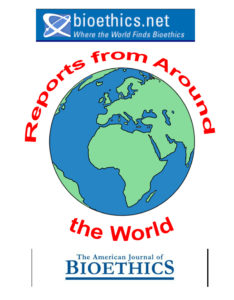 by Henri-Corto Stoeklé Ph.D., Asmahane Benmaziane M.D., Philippe Beuzeboc M.D., Christian Hervé, M.D., Ph.D.
by Henri-Corto Stoeklé Ph.D., Asmahane Benmaziane M.D., Philippe Beuzeboc M.D., Christian Hervé, M.D., Ph.D.
In a letter published in The American Journal of Bioethics, we wrote “now really isn’t the time for ethical reflections” in the face of COVID-19. This did not mean that nothing should be done to help clinicians in this time.
We believe that the development of specific multidisciplinary team meetings (MTMs), well known in oncology, could be vital. Actually, at the request of the clinicians themselves, we have created a new entity of this type at Foch Hospital in France.
This support for professionals is a new entity, meeting the needs of each hospital confronted with such a pandemic. This MTM has the following characteristics:
- Collation of the information obtained from public health doctors (including epidemiologists in particular) and of the recommendations issued by the various academic societies concerning therapeutic practices called into question by the pandemic, for a “reconsideration” of “guidelines” in the new situation.
- Meetings of clinicians representing all the disciplines involved in this reconsideration of therapeutic practices, favoring essential transdisciplinary thinking. Questions about the “reconsideration” of such and such a practice are posed by all, and in this transdisciplinarity over and above the simple presence of the different disciplines should facilitate possible and concerted changes in clinical practice with the actors concerned.
- Convergence of all the available scientific (biologists, sociologists, anthropologists etc.), philosophical and legal knowledge, adding greater depth to the arguments and lending more legitimacy to the decisions taken, with full responsibility, by the healthcare professionals.
The principal objective of these “emergency MTMs” is to help the clinicians resolve the contradictions they observe between their clinical practices and the standards imposed by good clinical practice in normal conditions.
This approach extends the proposal of the French national ethics committee (CCNE) to create “ethical support cells” to help clinicians in cases of difficult medical decisions. However, this “emergency MTM” has a much stronger medical, scientific and argumentative dimension, making use of knowledge from life sciences and from human and social sciences.
We believe that the development of “emergency MTMs” could be vital in the face of COVID-19, and probable future epidemics or pandemics.